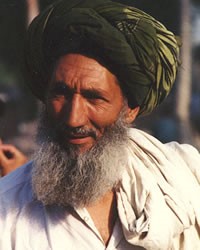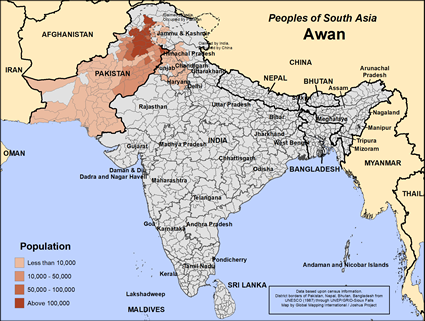Historians describe the Awan as valiant warriors and farmers who imposed their supremacy on the Janjua in part of the Salt Range and established large colonies all along the Indus to Sind. The Awan were among those the British considered to be "martial races" and, as such, formed an important part of the British Indian Army. In particular, the Awan were part of the core Muslim group recruited by the British during the First and Second World Wars.
Awan people belong to the Zamindar or landowning class, and many Awan families to this day live on and cultivate land which their ancestors have held for centuries. They are exclusively Muslim and probably the descendants of some of the earlier Muslim invaders of the tenth century or earlier.
Awan people have been entirely Muslim for centuries.
The Awan people are Sunni Muslims who believe that the supreme God, Allah, spoke through his prophet, Mohammed, and taught mankind how to live a righteous life through the Koran and the Hadith. To live a righteous life, you must utter the Shahada (a statement of faith), pray five times a day facing Mecca, fast from sunup to sundown during the month of Ramadan, give alms to the poor, and make a pilgrimage to Mecca if you have the means. Muslims are prohibited from drinking alcohol, eating pork, gambling, stealing, slandering, and making idols. They gather for corporate prayer on Friday afternoons at a mosque, their place of worship.
The two main holidays for Sunni Muslims are Eid al Fitr, the breaking of the monthly fast and Eid al Adha, the celebration of Abraham's willingness to sacrifice his son to Allah.
Sunni religious practices are staid and simple. They believe that Allah has pre-determined our fates; they minimize free will.
In most of the Muslim world, people depend on the spirit world for their daily needs since they regard Allah as too distant. Allah may determine their eternal salvation, but the spirits determine how well we live in our daily lives. For that reason, they must appease the spirits. They often use charms and amulets to help them with spiritual forces.
The Awan have put their identity in the Islamic religion for centuries. They do not believe they need a sin-free savior.
Pray the Awan people would see they can enjoy abundant life if they put their trust in Jesus Christ.
Pray for the Lord to intervene in their families, calling people to his side and blessing them in every way.
Pray for loving workers.
Pray for their hearts to be drawn to the Lord of lords.
Pray for a church planting movement to thrive in their communities.
Scripture Prayers for the Awan in Pakistan.
| Profile Source: Joshua Project |











